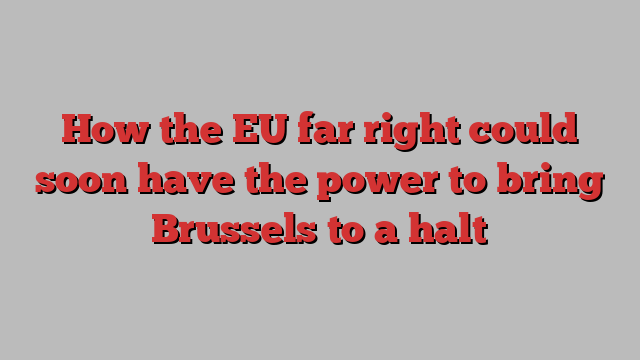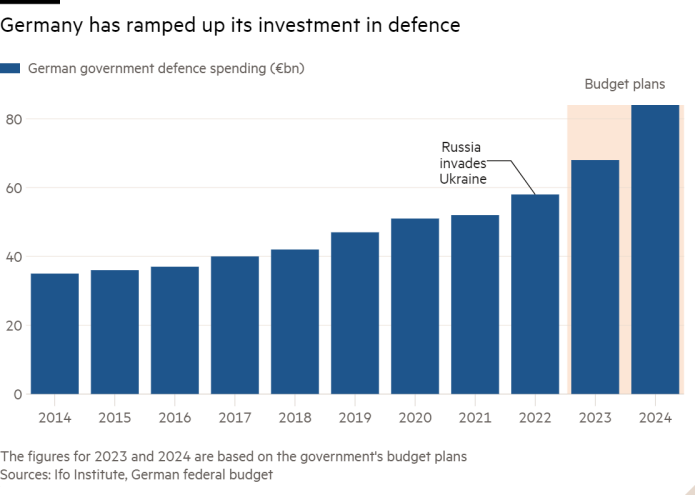
This article is an on-site version of our Europe Express newsletter. Premium subscribers can sign up here to get the newsletter delivered every weekday and Saturday morning. Standard subscribers can upgrade to Premium here, or explore all FT newsletters
Good morning. Hungarian Prime Minister Viktor Orbán, the EU and Nato’s most prominent pro-Russian leader, travels to Kyiv today for the first time since Moscow’s full-scale invasion of the country.
Today, we explore how EU far-right governments working in tandem could hold a blocking minority to veto decisions, and our man in the Balkans reports on the latest attempt to form some kind of stable government in Bulgaria — and the fears of what could follow another failure.
Tipping point
Should the far-right Rassemblement National win a majority in the second round of France’s elections, it would not only create fractures in domestic politics but could give hard-right parties veto powers over EU legislation, writes Alice Hancock.
Context: Marine Le Pen’s RN, which has its roots in neo-Nazi sympathisers and campaigns on low taxes and tough immigration rules, on Sunday won a landslide in the first round of a snap parliamentary election called by President Emmanuel Macron following EU elections in June.
Because of France’s second round run-off, it is not clear whether RN would win an outright parliamentary majority. But even a narrow victory could “paralyse” EU decision making, French MEP Pascal Canfin told the Financial Times.
Canfin, a liberal lawmaker widely seen as Macron’s man in the European parliament, pointed out that when at least four member states representing 35 per cent of the EU’s population abstain or vote against legislation, the file cannot pass.
Add together the far-right governments of Giorgia Meloni in Italy and Viktor Orbán in Hungary, Slovakia’s eurosceptics and the newly formed Dutch government plus a potential RN-dominated French administration and you get five member states representing 35.7 per cent of EU citizens — a 0.7 per cent margin that gives a blocking minority.
Belgium could soon follow a similar track if the Flemish nationalist party N-VA makes headway with coalition negotiations.
Under the French system, while the president has say over foreign policy and security affairs, the day-to-day running of the country lies with the government, which could well be heavily populated by RN ministers.
“Of course [right-wing governments] don’t always agree on everything,” said Canfin, who currently chairs the parliament’s environment committee.
He pointed out that hard-right groups varied a lot in their stances towards Ukraine. “But on migration, green issues, human rights progress, they will likely coalesce and that will mean there will be a collective veto for [the] extreme right if they start working together,” he added.
RN has already vowed to reduce taxes on fossil fuels, if it should win a majority, and cut subsidies to wind farms, for example.
“They would paralyse Europe,” Canfin said.
Chart du jour: War effort

Germany’s fabled “Mittelstand” manufacturing and engineering companies are increasingly pivoting to defence industry contracts as demand soars, in a generational shift in attitudes to the arms industry.
Uncle Bulgaria
Bulgaria’s sixth election in three years has once again failed to generate a stable ruling majority, opening up the nation of seven million to the rise of parties with a high exposure to corruption and Russian influence, writes Marton Dunai.
Context: Bulgaria, one of the EU’s poorest and most corrupt countries, held snap elections on June 9, the same day as the European parliament vote, after a previous grand coalition of centre-right GERB and the liberal We Continue the Change (PP) imploded over internal disagreements in March.
GERB won the vote and was yesterday given a mandate to try to form a minority government. But that is unlikely to dispel doubts about its long record of graft accusations.
A staunch contributor to western aid for Ukraine amid Russia’s full-scale invasion, Bulgaria produces much-needed arms and ammunition used by Kyiv. It also strives for further western integration, although its coveted memberships of the Eurozone and the EU’s passport-free Schengen zone have been delayed.
Amid ongoing calls for anti-graft and economic reforms, GERB will enlist Movement for Rights and Freedoms, a group mostly representing the country’s ethnic Turks under the leadership of US-sanctioned business and media tycoon Delyan Peevski.
Former premier Nikolay Denkov of PP told the FT corruption opens the country up to Russian influence.
All other parties have refused to work with GERB, which was in power until prime minister Boyko Borisov’s rule came to an end amid massive anti-corruption protests.
In June GERB received 68 seats in the 240-seat parliament, while MRF got 47 seats. PP was nearly edged out by the far-right, pro-Russia Revival party, each just shy of 40 seats.
Prime Minister-designate Rosen Zhelyazkov, a 56-year-old lawyer and former parliament speaker, will need to find a majority with outside support from a smattering of smaller parties or hand over the right to try to other groups.
What to watch today
-
Russian President Vladimir Putin takes part in an SCO summit in Kazakhstan.
-
EU publishes unemployment data for May.
Now read these
Recommended newsletters for you
The State of Britain — Helping you navigate the twists and turns of Britain’s post-Brexit relationship with Europe and beyond. Sign up here
Chris Giles on Central Banks — Your essential guide to money, interest rates, inflation and what central banks are thinking. Sign up here
Are you enjoying Europe Express? Sign up here to have it delivered straight to your inbox every workday at 7am CET and on Saturdays at noon CET. Do tell us what you think, we love to hear from you: [email protected]. Keep up with the latest European stories @FT Europe